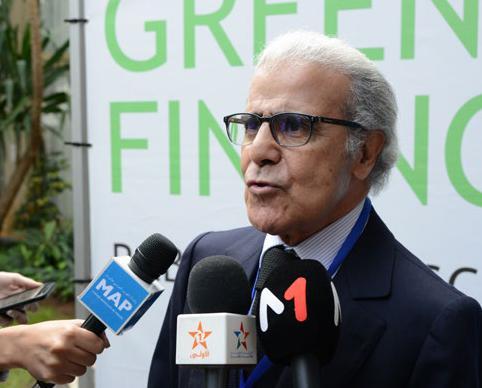
9 minute read
STRATEGIC OBJECTIVE 1
ACHIEVEMENTS
Advertisement
AFI continued to support members in developing financial inclusion policies and regulations to achieve their national financial inclusion goals in line with the Accords endorsed by members at the annual Global Policy Forum.
A total of 682 policy changes have been implemented by AFI members in 79 countries since AFI was established in 2009, of which 117 (or 17 percent of the total) were implemented in 2019.
In 2019, the knowledge products and tools produced by AFI’s Working Groups were elevated into guidance for devising financial inclusion policies or into policy models as guided by the Framework for the Issuance of Financial Inclusion Policy Models adopted by the AFI Membership Council at the 2018 AGM.
The Framework provides a systematic, member-based issuance process that uses practical tools developed by the Working Groups to aid members with policy development. Similarly, at the regional level, the Expert Groups on Financial Inclusion Policy developed specific policy frameworks to address regional policy needs or regulatory challenges.
In 2019, AFI produced a total of 31 knowledge products, including: > 2 annual reports > 3 case studies > 6 guideline notes > 2 member series > 2 policy models > 1 policy framework > 1 toolkit > 1 roadmap > 1 event report > 3 special reports > 9 factsheets
KEY ENABLERS
1. WORKING GROUPS
As AFI’s member-based content generation platform, the Working Groups continued to codify practical policy solutions from the network to support the issuance of policy guidance. In 2019, the high-impact policy lessons documented by the Working Groups were adopted as financial inclusion policy models or guidance by AFI members at the AGM. The following policy models were aligned with international good practices and presented members’ experiences as evidence of effective policy implementation in different thematic areas: > Policy Model for E-Money developed by the Digital
Financial Services Working Group (DFSWG) guides members through the development of proportionate key regulatory and policy measures to enable, promote and enhance the use of e-money services and products. > AFI Core Set Policy Model developed by the
Financial Inclusion Data Working Group (FIDWG)
provide evidence and guidance to members on developing a framework to measure financial inclusion.
In 2019, AFI established the Inclusive Green Finance Working Group (IGFWG) to build a body of best practices in response to members’ growing interest in learning more about, and addressing the challenges of, inclusive green finance.
13
A total of 13 peer reviews were conducted by AFI’s Working Groups.
Some of the highlights from Working Group activities in 2019 include:
The Consumer Empowerment and Market Conduct Working Group (CEMCWG) conducted peer reviews for the Bank of Uganda, Royal Monetary Authority of Bhutan and National Bank of Tajikistan, and published the following knowledge products: > Complaint Handling in Central Bank Framework to provide guidance for members on how central banks can manage their responsibility to handle consumer complaints efficiently and effectively without eroding the benefits of the core supervisory work for consumer protection and market conduct.
> Experiences in the Implementation of the Principle
of Disclosure and Transparency is a survey report that aims to improve understanding of the implementation challenges members face.
The Digital Financial Services Working Group (DFSWG) developed the Policy Model for E-Money, which was ratified by the AFI membership; conducted peer reviews for the Central Bank of Egypt, Central Bank of Sierra Leone and Central Bank of Sri Lanka; and published the following knowledge products:
> Cybersecurity for Financial Inclusion: Framework
and Risk Guide provides guidance for regulatory and supervisory authorities to devise tools for the financial sector to deal with cybersecurity risks, and for financial service providers to strengthen cyberrisk management in the provision of financial services to underserved consumers.
> Policy Framework for Women’s Financial Inclusion
Using Digital Financial Services provides guidance for regulators and policymakers on using DFS to advance women’s financial inclusion through lessons, good practices and successful interventions by AFI members.
> Special Report on KYC Innovations, Financial
Inclusion and Integrity explores know-your-customer (KYC) solutions that promote financial inclusion and strengthen anti-money laundering and combating the financing of terrorism (AML/CFT) measures.
> Guideline Note on Digital Financial Services
Indicators provides guidance for members to formulate DFS indicators that take all types of digital financial services into account. The Financial Inclusion Data Working Group (FIDWG) developed the Policy Model for the AFI Core Set of Financial Inclusion Indicators, which was ratified by the AFI membership, and published the Special Report
on a Client Needs-Centered Approach to Financial
Inclusion Measurement to share the findings of a pilot testing of an innovative financial inclusion data framework for the financial needs of customers in selected countries. The FIDWG also conducted peer reviews for Banco Central Timor Leste and SUGEF Costa Rica and produced three deliverables: (i) Financial Inclusion Supply-Side Measurement Framework; (ii) Financial Sex-Disaggregated Data Templates Toolkit; and (iii) Monitoring and Evaluation for National Financial Inclusion Strategies Guideline Note.
The Financial Inclusion Strategy Peer Learning Group (FISPLG) conducted peer reviews of the National Financial Inclusion Strategies (NFIS) of the Central Bank of Liberia and Da Afghanistan Bank, and published the following knowledge products:
> Guideline Note on Effective Stakeholder
Coordination for National Financial Inclusion
Strategy Implementation guides members through establishing the necessary structures and processes to manage financial inclusion stakeholders effectively.
> Guideline Note on Communication Strategies for National Financial Inclusion Strategy
Implementation guides members through the development, processing, dissemination and sharing of information to support the implementation of an NFIS.
The Global Standards Proportionality Working Group (GSPWG) conducted a peer review for the Central Bank of Sierra Leone and reviewed the following: AML-CFT Inclusive Financial Integrity Toolkit; progress on the development of the Joint AFI-IADI Issues Paper on Deposit Insurance, Financial Inclusion and E-Money; the updated methodology review by the Basel Subgroup and a compilation of case studies by the Non-Bank Financial Institutions (NBFIs) Subgroup on the Regulation and Supervision of NBFIs. The GSPWG also agreed on an approach for preparing the Special Report on RegTech for Financial Inclusion.
The SME Finance Working Group (SMEFWG) conducted peer reviews for the Central Bank of Solomon Islands, Ministry of Finance Eswatini and Bank of Zambia, and developed the following knowledge products: > SME Finance Guideline Note, which guides and encourages dialogue among members when developing policy and regulation for SME access to finance.
> Case Study on Gender, Women’s Economic
Empowerment and Financial Inclusion in
Zimbabwe, which showcases policy interventions made by the Reserve Bank of Zimbabwe to enhance gender economic empowerment and financial inclusion in line with domestic commitments and the
Sustainable Development Goals (SDGs).
The Inclusive Green Finance Working Group (IGFWG) held their inaugural meeting at the 2019 Global Policy Forum in Rwanda. Members were oriented to AFI’s work on IGF with a presentation of the 4P Framework for IGF policies (Provision, Promotion, Prevention and Protection) and reports from the IGF subgroups in other Working Groups, including a report by the SMEFWG on integrating adaptation and mitigation policies to strengthen the resilience of MSMES, a survey by the FIDWG on the Impact Measurement Framework of IGF and PIRI’s update on Disaster Preparedness and Response within the PIRI Regional Workstream. The IGFWG established three new subgroups to work on different priorities in the IGF Workstream: Promotion of IGF to the Private Sector; Greening the Financial Sector and Green Bonds; and Climate Risk Insurance for Agriculture.
2. REGIONAL INITIATIVE TECHNICAL GROUPS
AFI’s Regional Initiatives continued efforts to issue guidance on policy development with the support of the technical groups, known as the Experts Group on Financial Inclusion Policy (EGFIP). The EGFIP also worked with leaders of the Regional Initiatives to adopt work plans for knowledge products that will address pressing regional policy needs.
See page 24 for further information on AFI’s Regional Initiatives.
Update on Other Regions
AFI does not currently have a formal regional initiative for the Asia region, but collaborates with the Association of Southeast Asian Nations (ASEAN) Financial Inclusion Initiative in supporting specific deliverables for the region. At the roundtable meeting held during the week of the Global Policy Forum in Kigali, members from the Asia region identified challenges related to digital financial literacy in the region that could be addressed through work in the AFI network, including: conducting program evaluations; building sustainable financial literacy programs; and scaling and customizing programs to different countries and regions based on stakeholder mapping and the local context.


AFIs REGIONAL INITIATIVE TECHNICAL GROUPS
FINANCIAL INCLUSION INITIATIVE FOR LATIN AMERICA AND THE CARIBBEAN (FILAC)
Members adopted a regional work plan for 2020 focused on financial education, communication, FinTech, microinsurance and green finance, the deliverables for which will include a toolkit on financial education initiatives and a guideline note on closing the gender gap in the region. Members also agreed to conduct two capacity building programs: Data Science on Financial Inclusion and Financial Inclusion Empowerment and a workshop on institutional analysis and strategic communication. Members will also focus on strengthening partnerships with GAFILAT, Visa and Mastercard to support the development of smart financial inclusion policies.
AFRICAN FINANCIAL INCLUSION POLICY INITIATIVE (AFPI)
AfPI Leaders endorsed the Policy Framework for Responsible Digital Credit in Africa as a tool for sharing best practices and improving capacity to regulate and supervise digital credit in Africa. Members also shared their experiences in implementing the two policy frameworks adopted in 2018 — DFS Interoperability and Innovative Cross-Border Remittances — and identified technical topics, knowledge products and capacity building interventions to support the implementation of the two policy frameworks.
FINANCIAL INCLUSION FOR THE ARAB REGION INITIATIVE (FIARI)
Members reviewed and discussed the annual report of FIARI’s first year of activities and agreed to develop a Digital Financial Inclusion framework for the Arab region as a priority for 2020. AFI will focus on strengthening engagement between FIARI partners, namely the Arab Monetary Fund (AMF), GIZ and the World Bank Group, to help achieve regional financial inclusion goals.
EASTERN EUROPE AND CENTRAL ASIA POLICY INITIATIVE (ECAPI)
Members resolved to develop four knowledge products in 2020 on the following topics: digital financial services; market conduct regulation and supervision; and financial education and impact measurement. Development of the technical content for each knowledge product will be led by a member institution.
PACIFIC ISLANDS REGIONAL INITIATIVE (PIRI)
PIRI Leaders adopted the FinTech Regional Regulatory Sandbox, Regional Regulatory Sandbox Guidelines and Implementation Plan and resolved to create a Disaster Preparedness and Response Subgroup under the IGFWG. Members also made progress on the Regional De-Risking Action Plan at a regional workshop with key stakeholders, such as the Asia/ Pacific Group on Money Laundering, SWIFT, IMF, World Bank, Asian Development Bank, as well as regulators and commercial banks from Australia, New Zealand and the United States. Members also supported AFI’s implementation of the PIRI Regulatory Sandbox in their respective countries.








